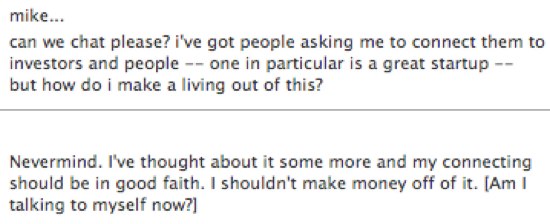First off, I’m friendly with Nick Bilton at the NY TImes. I like him personally. I think he’s a gifted writer and I’ve written good things about him in the past.
But I’ve also criticized him more than once and I’m going to do it again now. Not to generalize, but a lot of people who come to Silicon Valley from the east coast have an odd way of looking at success, more jealousy driven than anything else. I thought Bilton broke that stereotype, but the more I read of his stuff the more I wonder.
There was the Path take down earlier this year, which I thought was extremely unfair. And the recent party article that was more about poking fun at him than any real criticism.
Today his target is Craigslist.
It’s not that he’s criticizing Craigslist. I think there’s lots to gripe about there. But the impression I get from the article is that he decided on his conclusion – that Craigslist is a bully and wins only through legal action – and then built his facts around that conclusion. Because his arguments just don’t work.
From the article:
This isn’t the first time Craigslist has claimed such violations. The Internet is littered with carcasses that once built on top of the listings site. Their pixelated tombstones are inscribed with one-liners that Craigslist killed access without any notice, or they were sent a cease-and-desist letter by Perkins Coie, a top-notch corporate law firm that frequently represents Craigslist.
and
Most of the sites that Craigslist killed began as hobby projects, making little to no money — just programmers trying to make a product they loved, better.
and the money shot:
As intellectual property lawyers will tell you, Mr. Kidd is not off base: facts, like those in classified listings, cannot be copyrighted.
So why hasn’t anyone managed to unseat Craigslist, a site that has barely changed in close to two decades?
It has dug an effective moat by cultivating an exaggerated image of “doing good” that keeps its customers loyal, while behind the scenes, it bullies any rivals that come near and it stifles innovation.
His argument is basically:
1. Craigslist is stuck in the 90’s and sucks.
2. They are therefore ripe for disruption.
3. They avoid disruption by bullying rivals and stifling innovation
So none of that makes sense.
Nick is a design guy and it makes sense that Craigslist would horrify him – “it feels stuck in the 1990s, where links are electric blue and everything is underlined.”
But sometimes design doesn’t matter, even though that thought scares the hell out of designers. Craigslist works because it’s free and everyone uses it. The network effect has kicked in and there’s very little that can stop that. It took the Internet to defeat Windows. Ebay, another listings site stuck in the 90’s, has also yet to be disrupted.
None of that has to do with legal bullying. Entrepreneurs are free to compete with eBay and Craigslist, and often try. But the only way they have any shot at all is to build on top of Craigslist data to try to jumpstart usage. No one’s ever going to go to a listing site that has no listings. And if no one’s there, no one is going to list stuff.
Does Craigslist have some moral obligation to help competitors disrupt it by handing them their data? Nope. And despite Nick’s legal opinion, they can absolutely protect that data in the courts.
Should they? I don’t think so personally. When I was at TechCrunch we took the opposite approach with CrunchBase, for example. Anyone can take that data via the API with very few restrictions. We were right in thinking that as long as the data was free people would feel good about keeping CrunchBase as the central repository for that data. In my opinion it’s a more valuable asset than even TechCrunch today.
But this just proves my point. Craigslist wins whether they take legal action or not, because of the network effect. Nick’s hypothesis that Craigslist is just bullying people with lawyers to keep on top holds no water.
And if anything Craigslist undersells how much good it does. It’s a mostly free service that helps people connect endlessly around the world. To find jobs, buy things, and meet others. They extract very little value from their own network – unlike, say, Ebay, which does the opposite. Craigslist is an unqualified good thing. To say they exaggerate their image of doing good is incorrect and extremely unfair.
As a final point, Craigslist has eaten the NY Times’ classified listings lunch over the years. That’s a conflict of interest that needs to be disclosed in this kind of take down article.
Not everything that’s working in Silicon Valley has some nefarious evil plot behind it, Nick. Take off the New York City goggles for a moment, you might be amazed at what you see without that taint.


